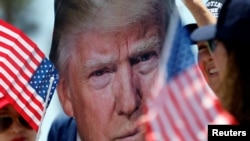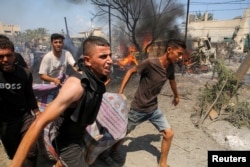State-run media in authoritarian countries have seized on the attempted assassination of former President Donald Trump to highlight increased polarization in the United States and redirect attention to unrelated foreign policy issues.
One propaganda narrative spread by Iranian state media and social media users is the claim that Western media outlets and officials have excessively focused on the July 13 attack on Donald Trump, while ignoring the plight of Palestinians in Gaza.
Iran’s state-run Press TV, for example, published an article with the headline, “Trump’s ear injury grabs more headlines than murder of 90 Palestinians in Gaza.”
Press TV referred to the July 13 Israeli airstrikes on the al-Mawasi camp in southern Gaza, which the Hamas-run Gaza health ministry said killed at least 92 people.
Israel said two senior Hamas militants who helped mastermind the deadly October 7 attacks, sparking the current conflict, were hiding among civilians in the camp.
Israel said it killed one of those commanders in the airstrikes.
The Press TV article included a July 14 post on X, formerly Twitter, from Chein Weihua, the European Union bureau chief of China’s state-run China Daily.
Chein wrote a reply to President of the European Commission, Ursula von der Leyen, who had wished Trump a speedy recovery and condemned political violence.
Chein replied: “Shocking. EU leaders responded more swiftly and strongly to assassination attempt at Trump than they responded at all to the mass killings of Palestinians in Gaza.”
That is misleading.
While von der Leyen did not tweet about Gaza that day, the European Union’s top diplomat Josep Borrell did comment on the al-Mawasi camp bombing on July 13.
“Again, an IDF [Israel Defense Forces] attack intended against Hamas targets seems to have provoked a carnage in Mawasi refugee camp, designated safe zone by Israel. Many civilians reportedly killed. Wars have limits enshrined in international law; end can’t justify all means We condemn any violation … Once again, we call for access to independent investigations and accountability [SIC], and for an end to the appalling situation of innocent civilians in Gaza.”
Two hours later, Borrell wrote a post condemning the assassination attempt on Trump and the use of political violence.
Borrell further condemned the “climbing human cost and wide-scale destruction caused in Gaza by this conflict” on July 15, calling the bombing of the Mawasi refugee camp “unbearable” and “unacceptable."
Meantime, many world leaders, including China’s President Xi Jinping, also expressed condolences to Trump.
While Chein singled out von der Leyen for not mentioning Gaza, China’s leader does not appear to have commented on the strike on the al-Mawasi refugee camp. Neither China’s Foreign Ministry nor major Chinese state news outlets mentioned any such statement from Xi.
Criticism that the Trump assassination attempt attracted more media attention than situation in Gaza or elsewhere in the world fits into a wider and older debate over why some events generate more media coverage.
The attempted assassination of a former president and a presidential candidate in world’s largest democracy resonated with millions around the world, including in China.
VOA’s Mandarin service reported, “Trump was shot” was the top trend on Weibo, a Chinese social media platform similar to X, on July 14.
The updates on the Trump shooting garnered significant attention on the platform.
He Yue, a member of the National Union of Journalists in the United Kingdom, told VOA that Chinese netizens seize on political events abroad like the shooting of Trump, since they “really cannot discuss Chinese politics” because of severe restrictions on free speech in the country.






